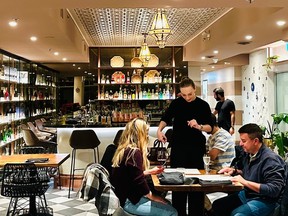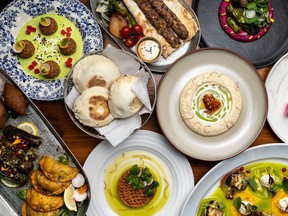“It took a long time getting the family recipes, developing my own, and cooking in restaurants.” — Yasma owner Sami Mousattat

Reviews and recommendations are unbiased and products are independently selected. Postmedia may earn an affiliate commission from purchases made through links on this page.
Article content
Yasma
Where: 550 Denman St., Vancouver
Article content
When: Dinner, Wednesday to Sunday
Info: 604-566-0493 yasma.ca
“This is the best food in the world!” a young Sami Mousattat’s dad would say, sitting down to dinner after returning to Aleppo, Syria, from a business trip abroad.
Mousattat, though, reserved that superlative for pizza and fast food.
“I would make fun of him,” he says. “But the moment I moved away, I realized he was so right. I really missed the food.”
Advertisement 2
Story continues below
Article content
When Mousattat moved to Toronto in 2004, he grilled his aunt and grandmother on how to cook the Syrian dishes he missed, made the slow-food, flavour-infusing way, like theirs. Their recipes called for a little bit of this, a little bit of that. “Nostalgia would take me back,” he says.
After working in the restaurant industry in Toronto and Vancouver, Mousattat finally opened Yasma, a Syrian-Lebanese restaurant, just as the pandemic struck. It began offering takeout from the Dark Table kitchen in Kitsilano, where he was part-owner and which had closed during the pandemic. Last year, he opened the bricks and mortar Yasma in a West End location that has seen a parade of short-lived restaurants. Yasma is bucking that trend with fresh, patiently cooked food, grandmother style, coaxing out great flavours and served with warm hospitality.
Mousattat had always wanted to showcase the food he grew up with.
“It took a long time getting the family recipes, developing my own, and cooking in restaurants,” he says. “In Syria, we have amazing cuisine but it’s in homes. With kibbeh, there’s 60, 70 varieties. You go to different homes and the flavours are all different. You don’t find that in restaurants.”
Article content
Advertisement 3
Story continues below
Article content
Middle Eastern cuisines overlap and in light of the conflicts and divisions in that region, the food brings people together, bonded by nostalgia.
“I walk into the dining room and see tables of Persians, next to Israelis, next to Palestinians — maybe not so much in the past month but it’s very cool. I’ve never had a problem.”

Mousattat’s sit-down restaurant showcases the cuisine better than his earlier takeout business. The food, homey and seemingly simple, starts with fresh, quality ingredients. Meats are sourced through Two Rivers and local farms, including Klippers Organic Acres, which grows herbs and peppers for him.
“It’s not like French cuisine. The methods are simple but it takes time and lots of steps,” he says. The lamb kibbeh appears to be minced lamb on a skewer but it’s not quite that simple. There’s an outer, crisper shell of meat, onion, spices, and cracked wheat, leading to a filling of meat and nuts. It can be grilled, fried, or served as lamb tartare.
To make falafel, the chickpeas take a 24-hour soak before they’re ground with spices. “It’s ground really several times, then again with the spices. They’re fried on demand at the perfect temperature. “It’s not complicated to make but it has to be fresh,” says Mousattat.
Advertisement 4
Story continues below
Article content
I loved the fresh and lively baba ganoush more than any I’d had before.
“In Syria, what we call baba ganoush doesn’t have tahini. It’s more of a salad,” he says. Ah, that’s why it’s so bright and light. The dish contains smoked eggplants, parsley, mints, peppers, onion, garlic, pomegranate seeds, lemon, garlic and walnuts. In Arabic, the name refers to a father named Ganoush.
The pita, served with some dishe are pillowy and inflated and the kitchen pumps out 500 to 700 a day, with the dough prepped in the morning for service.
Muhammara, a dip with roasted red pepper, spices, tahini, pomegranate molasses, walnuts, and kaak crumbs made from a small bagel-shaped biscuit flavoured with mahleb, an aromatic spice made from cherry kernel powder. Don’t worry, cherry pits can be toxic but not in the amount used as a spice. No more than nutmeg, which can also be dangerous in high doses.
Mousattat shared the secret that there’s ground coffee in the dip.
“In Aleppo, ground coffee is the secret weapon to a lot of things. It brings everything together.” Rose petals are another secret add to some dishes. “They’re the little things your aunties will tell you.”
Advertisement 5
Story continues below
Article content
Sambousak, a deep-fried tart filled with parsley, nigella seeds and Akwai, a soft cheese, won me over with its crisp, yet chewy dough and savoury filling.
Both the Aleppo kebab, with lamb, pistachios and peppers, and the chicken kebab, marinated in a yogurt, garlic and spice mix for 24 hours, were moist and delicious. His secret to the lamb kebab? Mixing meat from locally sourced shoulder, neck, and leg with a bit of extra shoulder or caul fat. Both dishes came with vegetables and sauces.
“We don’t eat them with sauces back home but it’s more expected here,” says Mousattat.
For dessert, we loved the qatayef, described as a “folded pancake with clotted cream, rose water syrup, and powdered pistachio.” It’s deep-fried, delicately crispy, then dipped in a rosewater syrup and strewn with rose petals and pistachios.
The wine list is modest but offers good choices from France and Italy. It’s also your chance to try some wines from Lebanon, which has an ancient tradition of wine making. Yasma serves bottles from the country’s best-known winery, Château Musar, featuring French varietals like Cabernet Sauvignon, Cinsault and Viognier. Cocktails riff on the classics but add a Middle Eastern spin with ingredients like pomegranate, yogurt, lemon, saffron, rose and apricot.
Advertisement 6
Story continues below
Article content
The room, dominated by an Arabesque wall made in Lebanon, sits right next to the Coal Harbour seawall. In summer, the room opens to a waterfront patio.
Our server, Shabi, was great, answering my many questions, and so invested I thought he might be the owner. But it’s no wonder — he’s an actor and his mom operates two Lebanese restaurants in Montreal.
twitter.com/miastainsby
instagram.com/miastainsby
newsproxy.site/vancouversun.com/tag/word-of-mouth-blog/
Related Stories
-

A fond farewell to two beloved Vancouver-area restaurants
-

Restaurant review: Seafood hits the spot in Vancouver’s unique Bar Bravo
Article content



Comments